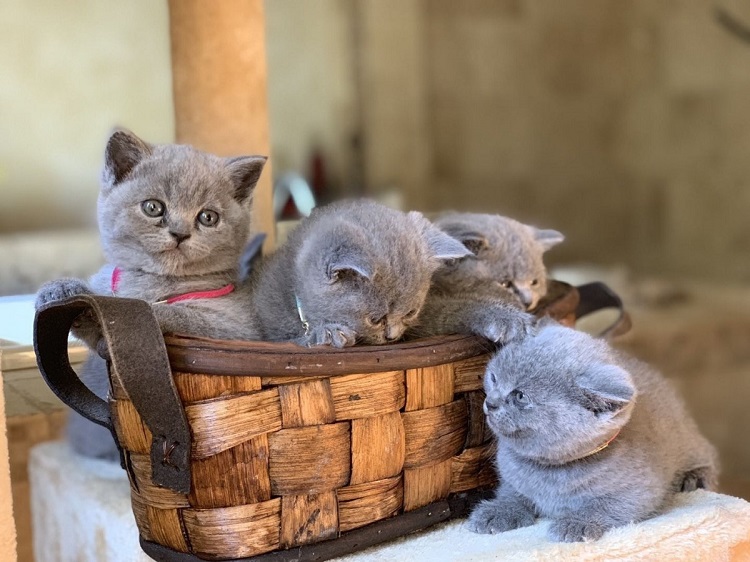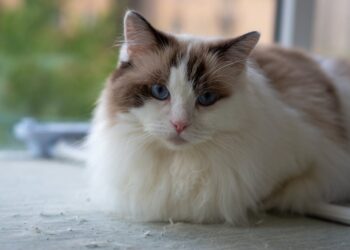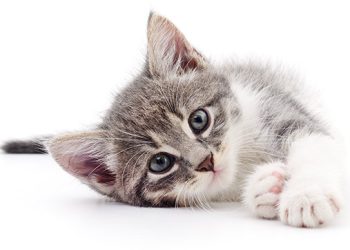Are you looking for the perfect family cat? Have you thought about adopting a British shorthair? The pleasant expression and chubby cheeks of these creatures make them fluffy and overly cute.
Despite their lovely appearance, British shorthairs are popular for their quiet, calm, and undemanding nature. You won’t be seeing them jumping onto counters or begging you for food on top of their voice. These felines aren’t keen on cuddling or showing affection to their owners in spite of their loyalty and devotion.
By adopting such a pet, you’ll most likely have a companion for about twenty years, which is the average lifespan of this breed.
The guide below will introduce you to the British Shorthair cat breed in terms of appearance, temperament, care, health, and history.
Appearance
British shorthairs are doubtlessly among the cutest cat breeds, resembling teddy bears. Most individuals show immediate affection towards these creatures because of their chubby cheeks and lovely round heads. The eyes of these felines are in distinctive colors such as orange, green, blue, or copper.
The dense coat of British shorthairs comes in various patterns and colors, including black, white, gray, cream, beige, tan, chocolate, brown, lilac, ebony, blue, etc. The most preferred coat among pet owners is the blue one, which is why these felines are also known under the name British Blues.
Temperament
British shorthairs are much beloved pets because of their undemanding nature, hence considered the ideal household companions. These adorable felines aren’t overly clingy, hyperactive, or mischievous. You won’t find them sneaking around the fridge or destroying your furniture. Their affection and playfulness is moderate, not exaggerated.
Just like the British, these cats are reserved when being introduced to their owners and, later on, strangers. Nevertheless, once their owners start gaining their trust, they turn into loving and devoted companions. In spite of their loyalty and devotion, they would never ask for your full attention. Learn more about the personality of one of the loveliest cat breeds.
Moreover, this cat breed is largely preferred by apartment owners due to its calm and quiet nature. British shorthairs are independent creatures, meaning you won’t have to worry about them experiencing anxiety when left alone in the house/apartment. Also, they aren’t exactly vocal, thus not being likely to disturb the neighbors. Instead of meowing loudly, these felines are fond of loud purring.
When it comes to bonding, British shorthairs show loyalty to all family members instead of selecting a favorite. Nevertheless, they would never be lap cats, as they refuse to be picked up or cuddled. These felines would rather sit next to you or curl up at the feet of their owners than sitting in their laps.
Care
As far as care is concerned, this cat breed is not extremely demanding. Due to its short and dense coat, it only requires brushing once a week to remove dead skin cells and hairs. Only in the course of spring, brushing has to be done more frequently owing to the shedding of their winter coat. Baths aren’t exactly required, as these felines pay attention to their hygiene and cleanliness.
In order to prevent periodontal disease, pet owners are advised to brush their teeth daily. Follow this link, https://catfriendly.com/cat-care-at-home/routine-caregrooming/how-to-brush-your-cats-teeth/, to learn how to brush your cat’s teeth. Make sure to trim their nails and clean their ears on a weekly basis. The litter box of these creatures must be pristine, as they have specific requirements regarding bathroom hygiene. If possible, keep your beloved companion indoors to prevent it from developing diseases and infections.
Health
British shorthairs are considered an incredibly healthy breed, having the potential to live up to as many as twenty years. Nevertheless, just like the other breeds, these felines are prone to experiencing some health problems. For instance, they might suffer from hypertrophic cardiomyopathy, referring to the thickening of their muscular heart walls. This condition manifests with lethargy, breathing difficulties, and appetite loss.
Moreover, this cat breed is genetically predisposed to developing Hemophilia B, known as a bleeding disorder. Make sure to take your companion to the veterinarian for a DNA test to see if it carries the disease. British shorthairs are at the risk of becoming obese unless owners encourage them to exercise regularly.
Even though these felines aren’t the most active of cats, they should be stimulated to exercise from a young age. There are numerous strategies to try to prevent them from gaining weight, such as providing them with interactive toys, lasers, climbing structures, balls, etc.
History
The British shorthair is believed to be one of the oldest cat breeds, known for its Roman origin. The Romans are thought to have brought these felines to England during the invasion of this country in order to protect their food from rodents. Consequently, they became street felines in a short period. The calm personality of these creatures soon made them welcome in the homes of people.
A man called Harrison Wier is believed to have domesticated these street felines at the end of the 1800s. He used selective crossbreeding to create this lovely breed. Nevertheless, it was officially recognized by the American Cat Association in 1967, followed by the International Cat Association in 1979. By the 1970s, the British shorthair was recognized on a worldwide level.
Final word
When looking for a family pet, this breed is undeniably the best choice!






